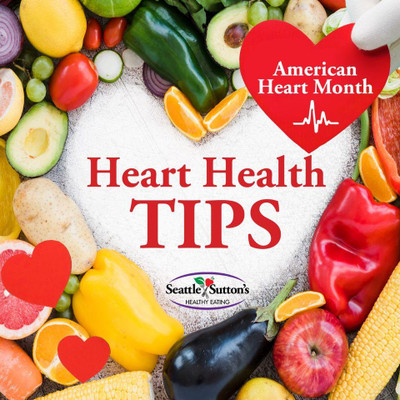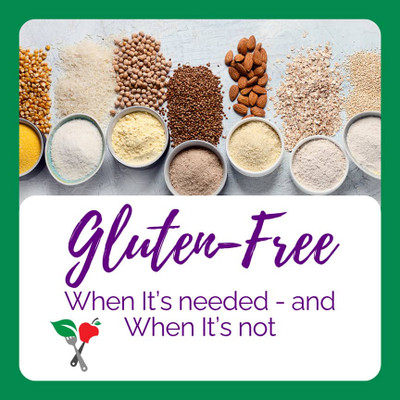Be Good to Your Heart with 4 Heart Healthy Tips
February is American Heart Month, a time dedicated to raising awareness about heart disease and promoting simple lifestyle changes that can make a big difference in preventing heart-related issues. At Seattle Sutton’s Healthy Eating, we are committed to helping you maintain a heart-healthy lifestyle with balanced meals that align with the American Heart Association (AHA) diet guidelines. These guidelines emphasize managing sodium, dietary fat, cholesterol, fiber, and sugar for optimal heart health. In honor of American Heart Month, we’re sharing four essential tips to improve cardiovascular health, lower your risk of stroke, and keep your heart in top shape.
Be Good to Your Heart Tip #1: Cut the Salt
Reducing sodium intake is a key aspect of a heart failure diet. Both the Dietary Guidelines for Americans and the AHA recommend consuming 2300 mg of sodium or less per day. Unfortunately, the average American consumes around 3400 mg daily—over 1000 mg more than recommended! While sodium is essential, too much can increase your risk of heart attack, heart failure, stroke, and other serious health issues.
To lower the salt in your diet, start by preparing more meals at home with fresh, low-sodium ingredients. This gives you control over what goes into your food, helping you manage your sodium intake better. Instead of reaching for the salt shaker, flavor your meals with herbs, spices, and salt-free seasoning blends. Ingredients like garlic, onions, and citrus fruits can add plenty of flavor without the extra sodium. Reading nutrition labels is also crucial; many foods, including bread, deli meats, and condiments, are hidden sources of sodium. Aim for low-sodium versions and rinse canned foods to remove excess salt. By making these changes, you’ll be on the right path to improving heart health and lowering your risk of stroke.
Be Good to Your Heart Tip #2: Increase Healthy Fats
Incorporating healthy fats for heart health is vital for maintaining good cholesterol levels and reducing the risk of heart disease. The AHA recommends replacing saturated and trans fats with unsaturated fats found in plant-based sources. Opt for polyunsaturated and monounsaturated fats from olive oil, avocado oil, nuts, seeds, and the best fish for heart health, such as salmon, mackerel, and sardines. These fats can lower bad cholesterol, provide essential nutrients, and contribute to overall cardiovascular health.
Including two servings of fatty fish per week is an excellent way to boost your intake of heart-healthy omega-3 fatty acids. These fats have been shown to lower the risk of heart disease and improve overall heart function. Nuts, particularly walnuts, are another great source of healthy fats. They’re easy to add to your diet and offer a wealth of nutrients, including fiber, vitamins, minerals, and antioxidants. Make nuts a regular part of your diet by adding them to salads, oatmeal, or yogurt for a delicious and heart-healthy boost.
Be Good to Your Heart Tip #3: Limit Saturated and Avoid Trans Fats
While healthy fats are beneficial, it’s important to limit saturated fats and avoid trans fats to keep your heart in the best possible shape. Saturated fats, found in animal products like beef, pork, and full-fat dairy, can increase bad cholesterol levels and the risk of heart disease. The AHA advises keeping saturated fats to no more than 6% of your total daily calories.
Trans fats, often found in processed and fast foods, are even more harmful. These artificial fats can raise bad cholesterol, lower good cholesterol, and increase the risk of heart disease and stroke. Although the FDA has made efforts to remove trans fats from the food supply, it’s still essential to check food labels for partially hydrogenated oils and steer clear of them.
When choosing cooking oils, go for those that are liquid at room temperature, like olive oil or canola oil, which are lower in saturated fat. Avoid tropical oils like coconut and palm oil, which are high in saturated fats. By making these small changes, you can significantly lower your cholesterol levels and improve your heart health.
Be Good to Your Heart Tip #4: Fill Up on Fiber
Fiber plays a crucial role in a heart-healthy diet. The best whole grains for heart health, along with fruits, vegetables, and beans, are excellent sources of dietary fiber that can improve cholesterol levels and lower your risk of heart disease, stroke, and even type 2 diabetes. Fiber-rich foods are also filling, which can help you maintain a healthy weight—a key factor in reducing the risk of cardiovascular disease.
When choosing whole grains, look for options where the first ingredient is listed as “whole,” such as whole wheat or whole oats. This ensures you’re getting a fiber-packed product. Include a variety of fruits and vegetables in your diet, aiming for at least five servings a day. Foods like berries and green peas are particularly high in fiber. Adding beans and lentils to your meals is another effective way to boost your fiber intake. These foods are not only rich in fiber but also provide essential nutrients like vitamins B1, B2, niacin, folate, and minerals like iron and magnesium.
To enhance your heart health even further, consider incorporating a small amount of dark chocolate into your diet. Yes, you read that right—heart health chocolate! Dark chocolate that is rich in cocoa can be beneficial for heart health when consumed in moderation. It’s packed with antioxidants and can help lower blood pressure, reduce inflammation, and improve blood flow, making it a delicious way to be good to your heart.
By following these four tips, you can take significant steps toward improving your heart health, lowering cholesterol, and reducing your risk of heart disease and stroke. A heart-healthy diet doesn’t have to be complicated—with the right foods and a little mindfulness, you can enjoy delicious meals while protecting your most vital organ.
At Seattle Sutton’s Healthy Eating we are proud that all of our meal plans follow the guidelines from the American Heart Association. Following a heart healthy diet shouldn’t be difficult, boring, and tasteless! By following these four “Be Good to Your Heart” tips you will have flavorful, healthy meals and your heart will thank you!
Interested in eating healthy? Hungry for more?








 Weight Loss
Weight Loss Health & Wellness
Health & Wellness Diabetes
Diabetes Heart Health
Heart Health Motherhood & Family
Motherhood & Family Dietary Restriction
Dietary Restriction Other Health Conditions
Other Health Conditions About SSHE
About SSHE


